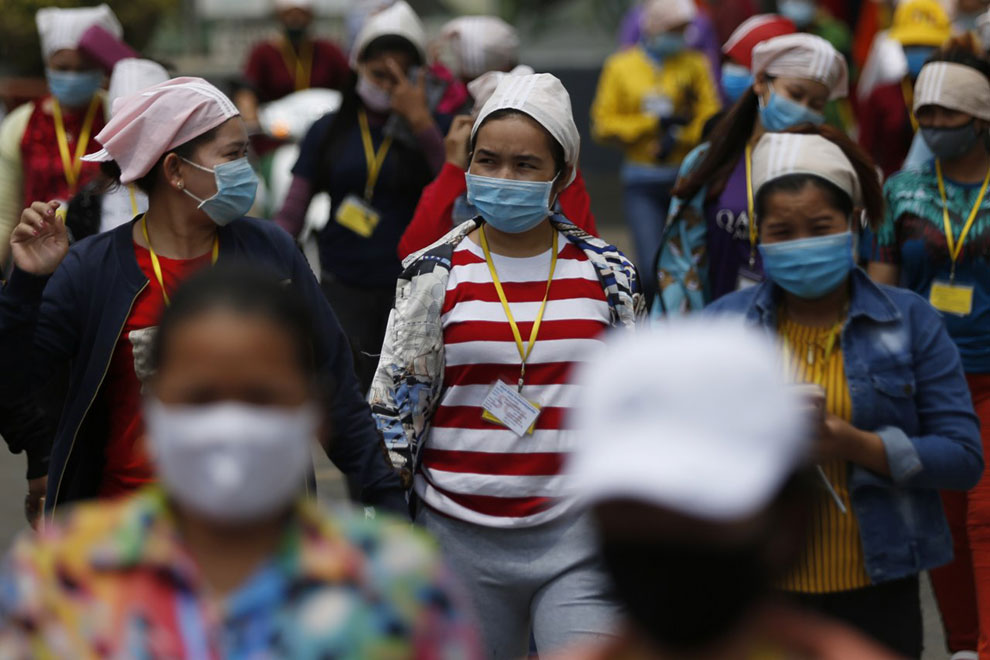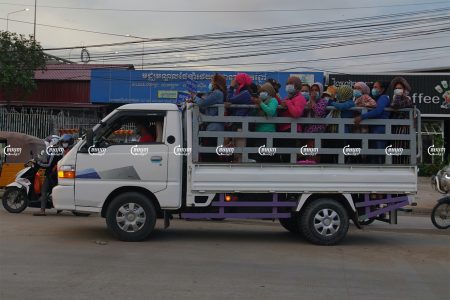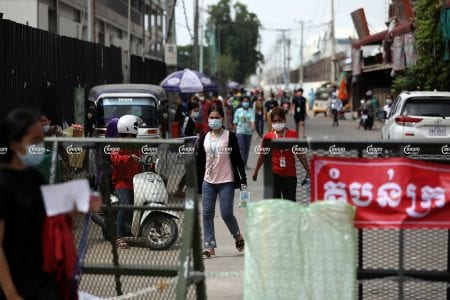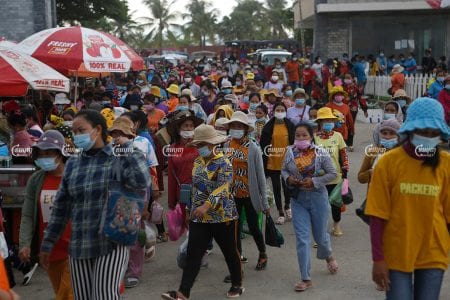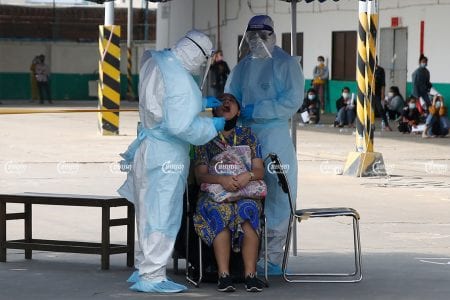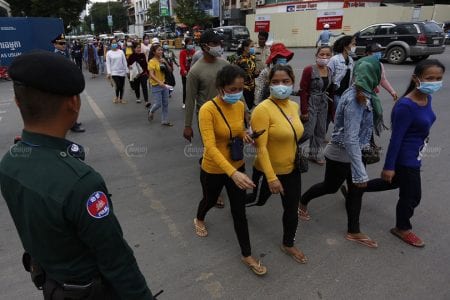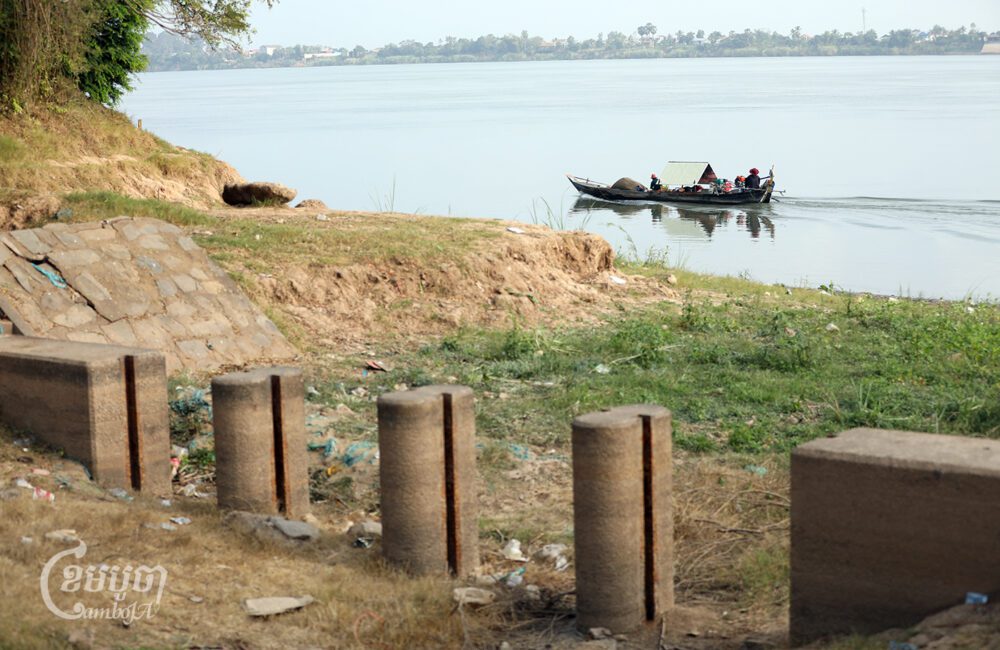A lawyer for QMI garment factory has denied claims made by union leaders and activists last month that the factory had unfairly terminated them due to their union involvement.
Sry Kim You, a lawyer for QMI factory, last week denied that any workers had been terminated due to their union activism, and said it was due to the global economic slowdown caused by the Covid-19 pandemic.
“Their statements are not accurate,” Kim You said of the workers’ complaints that their terminations had been unfair. “First, the reason QMI company reduced its workforce was because he [the factory owner] was facing a crisis due to Covid-19, so he needed to reduce the number of workers because business was suffering.”
He noted that the factory had laid off more than 100 workers in line with the conditions of their contracts and the Labor Law. He said QMI did not terminate the contracts of any workers who served as a union leader or representative.
“Before cancelling workers’ contracts, we reviewed their job performance and their work activity,” Kim You said. “In some cases, previously, they did not work hard enough, but the company had pointed that out to them before,” he said, adding that QMI did not target unionists during the process.
“It’s important that they pass their work performance assessments. If they work well, we keep them, but if they do not work well, the company will terminate them. We did not force anyone to end their contract unfairly.”
Kim You added that the factory had paid all the terminated workers in accordance with the seniority payments and benefits owed in each employee’s contract.
“The important thing is, we do not discriminate against workers who are union leaders and we do not fire union leaders…the company implemented decisions based on their work performance,” Kim You said.
He said that QMI factory, which is located in Kandal province’s Ang Snuol district, employs more than 4,000 workers, including members of six or seven unions. Between 130 and 140 workers have had their contracts ended since May, according to the lawyer.
The factory maintained a list of union leaders, Kim You said, adding that in order to end a union leader’s contract, the owners would have had to send a letter to inform the Labor Ministry and request that an official visit the factory to carry out a review. He also dismissed the use of the term “union activist” to describe some union members who were let go, saying it was not protected by the Labor Law.
CCAWDU President Kong Atith said that the points made by QMI’s lawyer were understandable, but that factory owners did not follow the correct procedure when terminating the union activists’ contracts.
“If they want to end their contracts, the factory should discuss it with our union,” Atith said. “I think that it is discrimination against my union.”
Atith said that because some of the fired CCAWDU union activists had worked at QMI for up to 10 years, it was unusual that the factory would not have terminated them earlier if their work was unsatisfactory. He said last month that in contrast, more recently hired junior workers had been retained.
“We will file a complaint to buyers and the Labor Ministry soon to review this problem,” Atith said.
Khul Samreth Phearum, a 47-year-old member of the Coalition of Cambodian Apparel Workers Democratic Union (CCAWDU) at QMI factory, said that she and three other members of the union were among those fired in April.
She said in an interview last month that it was clear to her that the four were selected due to their unionizing and that the termination was meant to send a message to other workers in the factory.
“They ordered us to thumbprint letters of termination without telling us any reason,” Samreth Phearum said.
In response to Kim You’s comments, she said the lawyer was merely making excuses for QMI’s mistakes.
“This is discrimination against our union,” she said.
Samreth Phearum added that the factory had only paid her for her final month of work, but did not provide her with seniority payment and other benefits owed. She said the decision to end her contract was unjust, since she had been working at QMI for eight years.
“If I could not work well, why didn’t the factory end my contract a long time ago?” she asked.
Chhay Thorn, 34, a union activist at QMI factory, said that he had been fired in a similar fashion to Samreth Phearum, and added that although he had worked at QMI factory for 13 years, he only received one year’s worth of seniority pay.
He said the factory owners could have intentionally laid off CCAWDU members because the union had sent the factory a list of its leaders and activists.
“The factory owners knew [the people they fired] were union activists of CCAWDU, so why did they still end their contracts?” Thorn said.
He added that he and the other fired activists had sent a complaint to CCAWDU so that the union could refer the dispute to the Labor Ministry.
“I demand that the factory allow us to return to work,” Thorn said.
Labor Ministry spokesman Heng Sour declined to comment.
In an interview on Radio France International’s Khmer-language service at the end of May, he had said that 20 factories had closed due to the recent economic slowdown and another 30 other factories had requested closures. More than 330 factories had temporarily suspended work, he added, but 103 of those had re-opened. He estimated that about 110,000 workers were still temporarily suspended from work.
Ken Loo, secretary-general of the Garment Manufacturers Association in Cambodia and Kaing Monika, its deputy secretary-general, could not be reached for comment.


